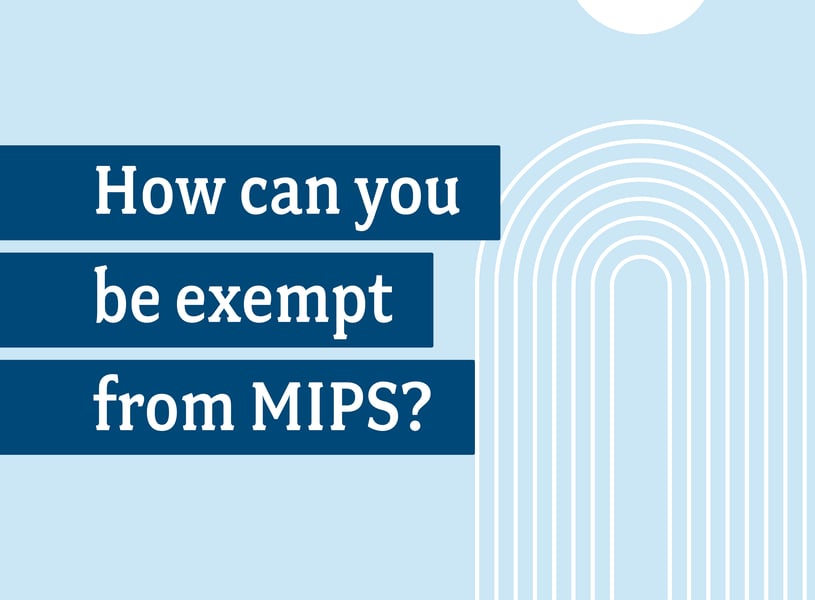How can you be exempt from MIPS?

As a clinician, there are four primary ways you can be exempt from MIPS: (1) you do not qualify as a MIPS eligible clinician; (2) you do not meet CMS’s annual low-volume thresholds; (3) you are newly enrolled in Medicare; and/or (4) you already participate in an Advanced Alternative Payment Model (APM).
Understanding your MIPS eligibility
Failure to qualify as a MIPS eligible clinician means you do not fall into one of the more than a dozen clinician types that CMS has identified as essential to MIPS program participation. The list of eligible clinician types is quite comprehensive and includes everything from physicians and physician assistants to occupational therapists and clinical social workers. The list is typically updated annually, so ineligibility in one year does not guarantee ineligibility for future years. Visit CMS’s website to learn more about how MIPS eligibility is determined.
Other ways you may be exempt from MIPS
If you are a MIPS eligible clinician, you may still be exempt from MIPS if you meet one of the other three criteria mentioned above:
- You fail to meet the low-volume threshold for Medicare billings or Medicare patients in a MIPS performance year. For example, the 2024 threshold is <= $90,000 in annual Medicare billings or <= 200 Medicare Part B patients. The threshold can change from year to year, so check with CMS for the latest minimums.
- You enroll as a clinician in Medicare after the MIPS performance year is already underway. January 1st marks the start of a new MIPS performance year. So, if you were to enroll in Medicare on January 15th, you would not be required to participate in MIPS until the next performance year.
- You are part of an Advanced APM. The key word here is Advanced. Advanced APMs are certified by CMS as meeting specific criteria around investing in value-based care and, as such, assume greater revenue risks and rewards. Individual clinicians must achieve Qualifying Participant (QP) status through CMS to be exempt from MIPS. APM clinicians who fail to meet QP status requirements must report through MIPS but will receive favorable scores in certain MIPS categories. Read CMS’s overview of Advanced APMs for additional guidance.
Check your MIPS status annually
It’s important to note that MIPS eligibility and reporting requirements change annually. Just as importantly, CMS has indicated that it plans to phase out MIPS over the next several years in favor of a new, more specialty-focused payment program known as MIPS Value Pathways (MVP).
For the latest MIPS updates, check out our guide to the 2024 Quality Payment Program Reporting Requirements. Or, to learn more about the MVP program, read our how-to guide on Getting Started with MIPS Value Pathways.
Need help managing your MIPS reporting requirements?
Learn more about the Medisolv MIPS Reporting Package, the proven MIPS management solution that lets you optimize your performance with drill-down precision.
Medisolv Can HelpAlong with award-winning software, each client receives a dedicated Clinical Quality Advisor that helps you with your technical and clinical needs. We consistently hear from our clients that the biggest differentiator between Medisolv and other vendors is the level of one-on-one support. Especially if you use an EHR vendor right now, you’ll notice a huge difference.
|

.png?width=352&name=2026%20Quality%20Reporting%20Deadlines%20Guide%20(1).png)



Comments